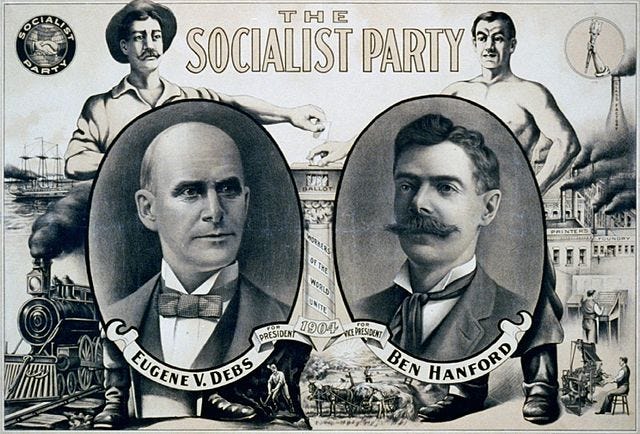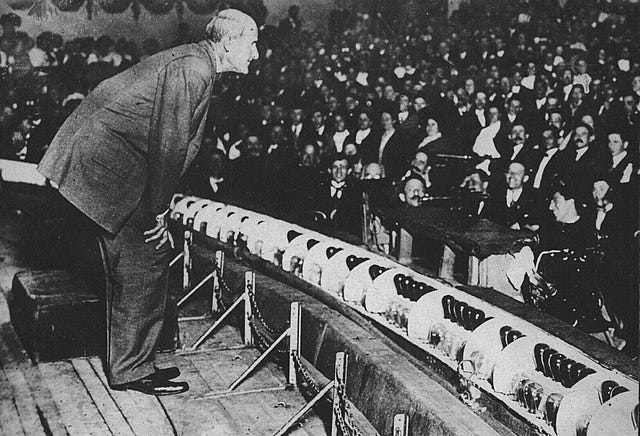
Bernie Sanders has said that Eugene V. Debs is his hero. In a recent article for The Nation entitled Bernie Sanders: Anti-Union Capitalism Is Wrecking America that was co-written with John Nichols, Bernie mentions Debs often. However, this article paints a misleading picture of the great American socialist because it omits much of his revolutionary views.
Bernie begins his article with a quote from Debs, “the very moment a workingman begins to do his own thinking he understands the paramount issue, parts company with the capitalist politician and falls in line with his own class on the political battlefield.” This quote came from Debs’ speech at the Socialist Party convention announcing his run for president in 1904. There is nothing wrong with this quote, but Bernie ignores that just a bit earlier in the speech Debs said:
Let me say at the very threshold of this discussion that the workers have but the one issue in this campaign, the overthrow of the capitalist system and the emancipation of the working class from wage-slavery. - Eugene V. Debs
This remains the issue today as the working class is involved in a life and death class struggle with the capitalist class. Debs goes on in his speech to discuss the class struggle at length, a fundamental part of Marxist theory. He comes out very strongly against the capitalist parties, including the Democratic and Republican parties of the time.
The Republican and Democratic parties, or, to be more exact, the Republican-Democratic party, represent the capitalist class in the class struggle. They are the political wings of the capitalist system and such differences as arise between them relate to spoils and not to principles. - Eugene V. Debs
For some reason this critique of the uniparty is lacking in Bernie’s article. Instead Bernie emphasizes Debs’ connection with trade unionism saying:
Debs was a trade unionist who played a crucial role in laying the groundwork for the rise of industrial trade unionism in America and the eventual development of the Congress of Industrial Organizations.
This is true, but in mentioning the Congress of Industrial Organizations (CIO) Bernie is doing Debs a disservice. The CIO was founded in 1935, almost a decade after Debs died and was originally created within the American Federation of Labor (AFL). The groundwork that Bernie refers to is that Debs was one of the founding members of the Industrial Workers of the World (IWW). The CIO itself was a radical organization with communist roots, but not nearly as radical as the IWW. The preamble to the IWW Constitution reads:
The working class and the employing class have nothing in common. There can be no peace so long as hunger and want are found among millions of the working people and the few, who make up the employing class, have all the good things of life.
Between these two classes a struggle must go on until the workers of the world organize as a class, take possession of the means of production, abolish the wage system, and live in harmony with the Earth.
The IWW was very open about their goal of abolishing the capitalist system and it is a strange omission to ignore Debs’ role in founding this union.
Bernie continues:
He was a presidential candidate who received millions of votes and whose platform greatly influenced the New Deal, and a man of great courage who spoke out against US participation in World War I—which resulted in his being sent to prison for three years.
Perhaps I’m being overly picky here, but why does the article link to the NYT articles on Debs’ arrest and not to the Canton speech? Debs did what Bernie doesn’t have the courage to do - he spoke out against US imperialism.
There is but one thing you have to be concerned about, and that is that you keep foursquare with the principles of the international Socialist movement. It is only when you begin to compromise that trouble begins. So far as I am concerned, it does not matter what others may say, or think, or do, as long as I am sure that I am right with myself and the cause. There are so many who seek refuge in the popular side of a great question. As a Socialist, I have long since learned how to stand alone. - Eugene V. Debs, The Canton Speech
Debs stayed true to the international Socialist movement until the end. His imprisonment took years off of his life, but that was a price he was willing to pay.
Back to Bernie:
While he has been dead for almost a hundred years, his life, work, and ideology remain enough of a threat to the corporate world that he has been virtually wiped out of our historical consciousness. There is an important lesson to be learned from that erasure.
It seems that Bernie is now participating in that erasure by omitting the most radical parts of Debs’ legacy.
Debs was a fervent believer in grassroots democracy and was opposed to authoritarianism and the cult of personality.
This question of authoritarianism is easy enough to answer. Debs was not anti-authoritarian. How do we know this? Because Debs was a revolutionary. It is true he hoped that the revolution could be achieved peacefully through industrial action, but nevertheless overthrowing the capitalist system will always require authoritarianism. Friedrich Engels demolished anti-authoritarian arguments in his short work On Authority:
Have these gentlemen ever seen a revolution? A revolution is certainly the most authoritarian thing there is; it is the act whereby one part of the population imposes its will upon the other part by means of rifles, bayonets and cannon — authoritarian means, if such there be at all; and if the victorious party does not want to have fought in vain, it must maintain this rule by means of the terror which its arms inspire in the reactionists. Would the Paris Commune have lasted a single day if it had not made use of this authority of the armed people against the bourgeois? Should we not, on the contrary, reproach it for not having used it freely enough? - Friedrich Engels, On Authority
Debs defended revolution in theory and in practice. In his biography of Debs, The Bending Cross, Ray Ginger describes Debs’ views on the dictatorship of the proletariat and the Russian revolution:
This viewpoint was supported by Eugene Debs. who again reproached his Socialist colleagues: "During the transition period the revolution must protect itself…I heartily support the Russian Revolution without reservation." - The Bending Cross, Pg. 398
To be anti-authoritarian is to be anti-revolution and Debs was most certainly not anti-revolution. Most of his life was spent working towards a socialist revolution in the United States.
Bernie concludes his article:
That pursuit will be challenging, but I am convinced the future for the working class holds all the possibility that Eugene Victor Debs foresaw. “Ten thousand times has the labor movement stumbled and fallen and bruised itself, and risen again; been seized by the throat and choked and clubbed into insensibility; enjoined by courts, assaulted by thugs, charged by the militia, shot down by regulars, traduced by the press, frowned upon by public opinion, deceived by politicians, threatened by priests, repudiated by renegades, preyed upon by grafters, infested by spies, deserted by cowards, betrayed by traitors, bled by leeches, and sold out by leaders,” he wrote at the dawn of the 20th century. “But notwithstanding all this, and all these, it is today the most vital and potential power this planet has ever known, and its historic mission of emancipating the workers of the world from the thralldom of the ages is as certain of ultimate realization as is the setting of the sun.”
This quote from an article by Debs published May 28, 1904 in The Social Democratic Herald. The title of this article was The Overmastering Passion for Profit. In this article, Debs does not refer to unfettered or uber-capitalism. He refers directly to the capitalist system:
The primal consideration in the present industrial system is profit. All other things are secondary. Profit is the life blood of capital — the vital current of the capitalist system — and when it shall cease to flow the system will be dead.
The capitalist is the owner of the worker’s tools. Before the latter can work he must have access to the capitalist’s tool house and permission to use the master’s tools. What he produces with these tools belongs to the master, to whom he must sell his labor at the market price. The owner of the tools is therefore master of the man. - Eugene V Debs
Does Bernie talk about ending the profit system? Does he talk about who owns the means of production? No, unfortunately he does not. Debs ends his article saying:
The most vital thing about this world movement is the educational propaganda — its capacity and power to shed light in the brain of the working class, arouse them from their torpor, develop their faculties for thinking, teach them their economic class interests, effect their solidarity, and imbue them with the spirit of the impending social revolution. - Eugene V. Debs
This is indeed what is needed. But Bernie is not educating the working class about their economic class interests and social revolution. When reading Debs’ speeches and writings it is easy to see that he was repeating the fundamentals of Marxism. Where Bernie skirts around these issues, Debs takes them head on. Bernie gives Debs credit for influencing the New Deal, but that was a reformist measure that did not go far enough to eliminate the capitalist system. The socialists and communists were fighting for far more than was achieved by the New Deal. Debs embraced the class struggle. He attacked the capitalist uniparty. He did not endorse Democratic warmongers but opposed them every step of the way. Debs praised the Bolshevik revolution and communism. He was a true revolutionary.
The difference between Bernie and Debs is that between reform and revolution. Bernie has settled on reformism, where Debs sought revolution. The difference is profound, as Rosa Luxemburg explained in 1900:
That is why people who pronounce themselves in favour of the method of legislative reform in place and in contradistinction to the conquest of political power and social revolution, do not really choose a more tranquil, calmer and slower road to the same goal, but a different goal. Instead of taking a stand for the establishment of a new society they take a stand for surface modifications of the old society. If we follow the political conceptions of revisionism, we arrive at the same conclusion that is reached when we follow the economic theories of revisionism. Our program becomes not the realisation of socialism, but the reform of capitalism; not the suppression of the wage labour system but the diminution of exploitation, that is, the suppression of the abuses of capitalism instead of suppression of capitalism itself. - Rosa Luxemburg, Reform or Revolution






Wonderful article! I never understood why Daniel Ortega and the Sandanistas held a vote just a few yrs after the revolution. Pressure from the capitalists and reformism to give the illusion of democracy--a hollow word when people starve under the IMF yoke.